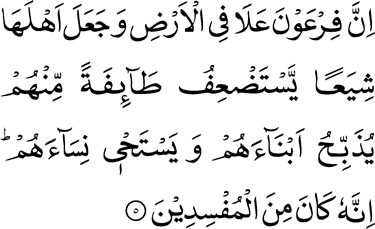Salaam Alaikum.
This is a question to Muslim posters, preferably Arabic speakers.
Can you please tell me is what exists below is a correct translation of the ayah? I am particularly interested in the part in red.
Indeed, Pharaoh exalted himself in the land and made its people into factions, oppressing a sector among them, slaughtering their [newborn] sons and keeping their females alive. Indeed, he was of the corrupters.
If the translation is incorrect, can you provide a better one?
If it is a correct one, can you please explain what it means?
Thanks so much!
This is a question to Muslim posters, preferably Arabic speakers.
Can you please tell me is what exists below is a correct translation of the ayah? I am particularly interested in the part in red.
Indeed, Pharaoh exalted himself in the land and made its people into factions, oppressing a sector among them, slaughtering their [newborn] sons and keeping their females alive. Indeed, he was of the corrupters.
If the translation is incorrect, can you provide a better one?
If it is a correct one, can you please explain what it means?
Thanks so much!


